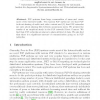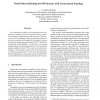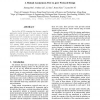DBISP2P
2004
Springer
14 years 5 months ago
2004
Springer
Distributed Hash Tables (DHTs) have been widely adopted in many Internet-scale P2P systems. Emerging P2P applications such as massively multi player online games (MMOGs) and P2P ca...
ATAL
2004
Springer
14 years 5 months ago
2004
Springer
For Peer-2-Peer (P2P) networks to realize their full potential their nodes need to coordinate and cooperate, to improve the performance of the network as a whole. But this requires...
SIGECOM
2004
ACM
14 years 5 months ago
2004
ACM
Lack of cooperation (free riding) is one of the key problems that confronts today’s P2P systems. What makes this problem particularly difficult is the unique set of challenges ...
PDCAT
2005
Springer
14 years 5 months ago
2005
Springer
This paper describes a new protocol for authentication in Peer-to-Peer systems. The protocol has been designed to meet specialized requirements of P2P systems, such as lack of dir...
IWDC
2005
Springer
14 years 5 months ago
2005
Springer
Peer-to-peer systems and applications are distributed systems without any centralized control. P2P systems form the basis of several applications, such as file sharing systems and ...
IICS
2005
Springer
14 years 5 months ago
2005
Springer
P2P systems draw large communities of users and create most of the Internet traffic. Two typical P2P myths are (1) that P2P is about sharing of audio and video content and (2) that...
BERTINORO
2005
Springer
14 years 5 months ago
2005
Springer
In this paper we present and evaluate uncoordinated on-line algorithms for simultaneous storage and replication load-balancing in DHT-based peer-to-peer systems. We compare our ap...
SAINT
2005
IEEE
14 years 5 months ago
2005
IEEE
New application scenarios, such as Internet-scale computations, nomadic networks and mobile systems, require decentralized, scalable and open infrastructures. The peerto-peer (P2P...
IPPS
2005
IEEE
14 years 5 months ago
2005
IEEE
Peer-to-Peer (P2P) computing has become a popular application model because of its easy resource sharing pattern and powerful query search scheme. However, decentralized P2P archi...
INFOCOM
2005
IEEE
14 years 5 months ago
2005
IEEE
— While current Peer-to-Peer (P2P) systems facilitate static file sharing, newly-developed applications demand that P2P systems be able to manage dynamically-changing files. Ma...



